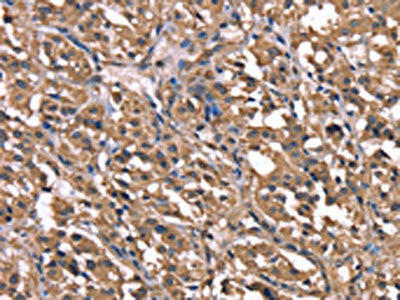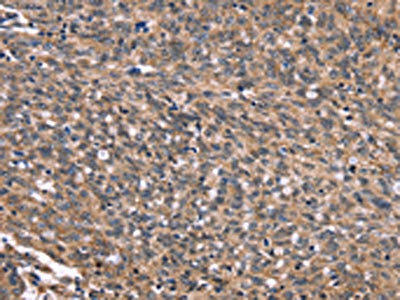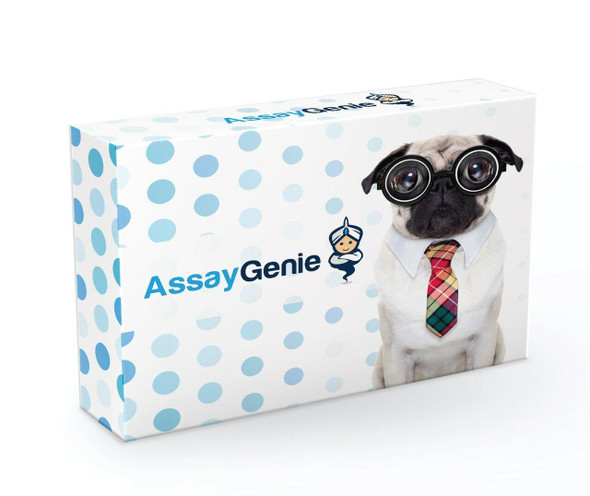Description
| Antibody Name: | GPR65 Antibody (PACO19740) |
| Antibody SKU: | PACO19740 |
| Size: | 50ul |
| Host Species: | Rabbit |
| Tested Applications: | ELISA, IHC |
| Recommended Dilutions: | ELISA:1:2000-1:5000, IHC:1:50-1:200 |
| Species Reactivity: | Human |
| Immunogen: | Synthetic peptide of human GPR65 |
| Form: | Liquid |
| Storage Buffer: | -20°C, pH7.4 PBS, 0.05% NaN3, 40% Glycerol |
| Purification Method: | Antigen affinity purification |
| Clonality: | Polyclonal |
| Isotype: | IgG |
| Conjugate: | Non-conjugated |
 | The image on the left is immunohistochemistry of paraffin-embedded Human thyroid cancer tissue using PACO19740(GPR65 Antibody) at dilution 1/20, on the right is treated with synthetic peptide. (Original magnification: x200). |
 | The image on the left is immunohistochemistry of paraffin-embedded Human ovarian cancer tissue using PACO19740(GPR65 Antibody) at dilution 1/20, on the right is treated with synthetic peptide. (Original magnification: x200). |
| Background: | TDAG8 (for T-cell death-associated gene 8) is a seven transmembrane G protein-coupled receptor (GPCR) that was originally identified from a human thyroid cDNA library and subsequently shown to be expressed predominantly in thymus, lymph nodes, peripheral blood leukocytes and spleen. TDAG8, which is alternatively designated GPCR25, is grouped collectively with other GPCRs that are induced during T cell receptor engagement-mediated apoptosis and T cell activation, which also include G2A (for G2 accumulation) and P2Y2 (for P2 nucleotide) receptor. |
| Synonyms: | G protein-coupled receptor 65 |
| UniProt Protein Function: | GPR65: Receptor for the glycosphingolipid psychosine (PSY) and several related glycosphingolipids. May have a role in activation- induced cell death or differentiation of T-cells. Belongs to the G-protein coupled receptor 1 family.Protein type: Receptor, GPCR; GPCR, family 1; Membrane protein, multi-pass; Membrane protein, integralChromosomal Location of Human Ortholog: 14q31-q32.1Cellular Component: integral to plasma membrane; plasma membraneMolecular Function: G-protein coupled receptor activityBiological Process: actin cytoskeleton reorganization; G-protein coupled receptor protein signaling pathway; immune response; multicellular organismal development; positive regulation of cAMP biosynthetic process; positive regulation of stress fiber formation; response to acidity |
| UniProt Protein Details: | |
| NCBI Summary: | |
| UniProt Code: | Q8IYL9 |
| NCBI GenInfo Identifier: | 37537957 |
| NCBI Gene ID: | 8477 |
| NCBI Accession: | Q8IYL9.1 |
| UniProt Secondary Accession: | Q8IYL9,O75819 |
| UniProt Related Accession: | Q8IYL9 |
| Molecular Weight: | 39,333 Da |
| NCBI Full Name: | Psychosine receptor |
| NCBI Synonym Full Names: | G protein-coupled receptor 65 |
| NCBI Official Symbol: | GPR65 |
| NCBI Official Synonym Symbols: | TDAG8; hTDAG8 |
| NCBI Protein Information: | psychosine receptor |
| UniProt Protein Name: | Psychosine receptor |
| UniProt Synonym Protein Names: | G-protein coupled receptor 65; T-cell death-associated gene 8 protein |
| Protein Family: | Psychosine receptor |
| UniProt Gene Name: | GPR65 |
| UniProt Entry Name: | PSYR_HUMAN |






